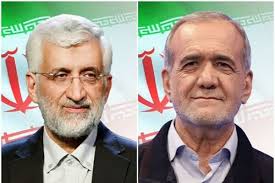Iran’s presidential run-off: censorship and Khamenei's appeal to stop Pezeshkian
Tomorrow the country goes to the polls to replace Raisi, who died in an helicopter crash. In the first round, a reformist lawmaker, Masoud Pezeshkian, and an ultra-conservative leader, Saeed Jalili, came out on top. With the support of Khatami and Rouhani, the anti-establishment candidate promises freedom of choice on the headscarf and better relations with the West.
Tehran (AsiaNews) – Ultra right-wing candidate Saeed Jalili ended his campaign yesterday evening for the runoff presidential election in front of a jubilant crowd of supporters in a prayer hall in the capital Tehran.
In his address, Jalili called on voters to come out and cast their ballot, while the crowd chanted "All Iran says Jalili," with the candidate responding with a pledge of "strength and progress."
At the same time, in a nearby, packed stadium, his reformist rival, Masoud Pezeshkian, ended his campaign by stressing “unity and cohesion", while the crowd chanted the name of another reformist, former President Mohammad Khatami, who came out in Pezeshkian’s favour.
"Long live Khatami, long live Pezeshkian" shouted those present, waving green flags adorned with the reformist candidate’s slogan "For Iran", charged by Pezeshkian’s success in breaking the monopoly of ultraconservatives and radical right-wingers.
Jalili and Pezeshkian are running for the post of president, the second highest office in the Islamic Republic of Iran after the supreme leader, Ayatollah Ali Khamenei, who has openly backed Jalili.
Tomorrow’s run-off follows a first round that saw a record low turnout, with many voters seemingly heeding the call by many activists and dissidents to boycott the election.
On 28 June, the reformist candidate won 10,415,991 votes (42.5 per cent), while his right-wing rival got 9,473,298 votes (38.6 per cent). Another right-wing candidate, Mohammad-Baqer Ghalibaf, speaker of the Majlis (parliament), came in a distant third with 3,383,340 votes.
Some 24,535,185 valid votes were cast for a turnout of 40.2 per cent, a new all-time low compared to 48.8 per cent in the 2021 when Ebrahim Raisi won the presidency. The latter died in an helicopter crash last May.
For Pezeshkian, getting to the runoff is already a success, because his rival benefitted from the support of the country’s political establishment and the interests of the clerical and conservative leadership.
Out of 14 presidential elections held in Iran since 1979, only one was decided in a second round, in 2005.
Ahead of the runoff, the Iranian government intensified its crackdown on the media, to control the narrative relating to the vote.
Supreme Leader Ali Khamenei acknowledged the poor turnout in the first round, saying that participation was “lower than expected”, 8 per cent lower than in the last election in 2021, already low by historic standards.
“We hope that people’s turnout for the second round [this Friday] will be important and a source of pride for the Islamic Republic,” said Supreme Leader Khamenei in an appeal to Iranians.
The success of the reformist candidate is the surprise of the first round, but right-wing groups are regrouping for the second. Whatever the outcome, the real power remains in the hand of the Supreme Leader.
But a Pezeshkian victory could change things and open new perspectives, especially in foreign policy given that, during the election campaign, he called for "constructive relations" with Western governments to end Iran's "isolation".
This position earned him the support of two former presidents, the moderate Hassan Rouhani and reformist Khatami.
"We can manage our country with unity and cohesion," Pezeshkian told his cheering supporters. "I will resolve internal disputes to the best of my ability,” he added.
Pezeshkian vowed to "fully" oppose police patrols to force women to wear the mandatory headscarf (which led to mass arrests and crackdown following the death of Mahsa Amini in 2022), and called for the easing of restrictions on the internet.
He spoke to a mixed crowd (while his rival address an audience segregated by gender), with women in colourful hijab mixed with others wearing black chadors.
“I believe if Pezeshkian wins... the people will have hope for the future,” said Sadegh Azari, 45, who works in the insurance industry.
24/05/2021 17:46







.png)










